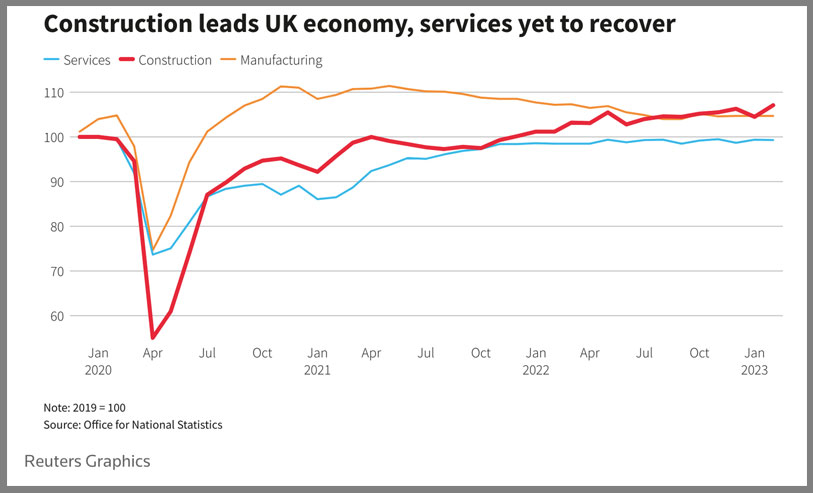Construction Bolsters UK Economy
Only one thing stood between Britain and a widely expected downturn over the winter: a strong performance by its construction industry which is unlikely to spark a broader revival of the economy.
Britain’s gross domestic product regained its pre-pandemic size in February, but the composition of growth by industry suggests fragility in its underlying health.
International Monetary Fund projections published last week showed Britain bottom of the world’s major economies in terms of expected economic growth in 2023, with a 0.3% contraction pencilled in, equivalent to a 0.7% fall on a per capita basis.
Britain’s vast services industry – about 80% of economic output – has yet to recover its pre-pandemic size.
While strikes by public workers hurt output in sectors like health, transport and education in February, the data point to more general problems within the sector.
Banking sector output remains 6% below its pre-pandemic level. The picture is worse still for retailers, with inflation running at over 10% hurting consumer demand.
Manufacturing, representing 10% of Britain’s economy, surged as the world emerged from COVID-19 lockdowns but it has since cooled, limiting its contribution to recent economic growth.
That leaves construction, with a weight of just 6% in the economy, as the only big driver of growth over the last six months – a rare occurrence.
Construction output now stands more than 7% above its 2019 average level – by far the strongest performing major sector of the last few years.
Construction is key to the economy and is responsible for one in every 20 jobs. But it is also a low-productivity sector that sucks in imports and labour, sometimes at the expense of higher-productivity and export-intensive industries.
Britain’s recent reliance on construction for economic momentum sits uneasily with finance minister Jeremy Hunt’s goal of creating an internationally successful, highly productive “next Silicon Valley” economy.

The recent data show surging British infrastructure construction – a development echoed by other European countries that are ramping up green energy projects, according to Marc Ostwald, chief economist at ADM Investor Services, a brokerage.
“But then you’re looking at the UK and saying: well, that’s basically an 80% services economy and it’s not really getting a lot of post-COVID traction,” Ostwald added.
“The underlying reason for that is the underlying weakness of the economy.”
Source: Reuters








Leave a Reply
Want to join the discussion?Feel free to contribute!